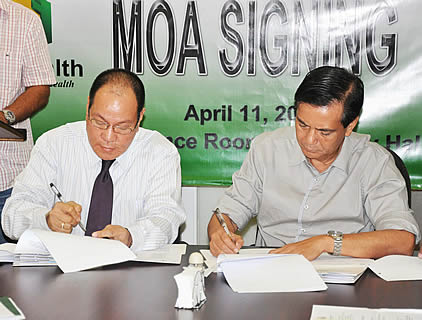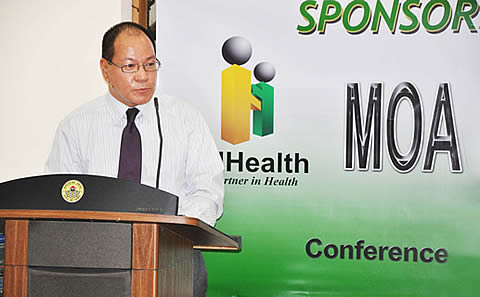PhilHealth
home | contact us | disclaimer
News
30,000 Cebu Urban Poor To Get PhilHealth Coverage April 14, 2011
PhilHealth Vice President for Region VII William O. Chavez and Cebu City Mayor Michael Rama recently signed a Memorandum of Agreement for the health insurance coverage of 30,000 poor families from 80 barangays in the city.
The City government's sponsorship intends to cover poor families in every barangay. Rama instructed the City Social Welfare Services (CSWS) to identify the qualified recipients for the sponsorship. Priority will be given to the 2,887 beneficiaries of the Pantawid Pamilyang Pilipino Program (4Ps) of the Department of Social Welfare and Development (DSWD).
As Cebu City and PhilHealth embark on this partnership of providing poor families with access to health care services, the face of health care in the City is set for change.
The PhilHealth law gives an incentive in the form of capitation to local government sponsors enrolling poor constituents under the Sponsored Program. In health insurance, capitation is a way of paying for specific health care services based on the number of patients covered over a specified period of time.
Under the Sponsored Program, local governments are paid back P300 per sponsored family per calendar year so that it can provide PhilHealth's outpatient primary consultation and diagnostic benefit package for free. However, payment of capitation is subject to the prior accreditation of the local government's rural health unit, or at least one health center in the case of a highly urbanized city, which shall serve as provider of the benefit package.
Preventive care should be made accessible to the poor. PhilHealth's outpatient benefit package for sponsored members is designed for this very purpose. It covers primary consultations with general physicians and laboratory fees for chest X-ray, complete blood count, fecalysis, urinalysis and sputum microscopy.
Cebu City's urban poor will soon have access to preventive care through their respective health centers. The City will be working out the accreditation of, initially, one of its health centers as provider of the outpatient benefit package.
The City's health centers, like rural health units, may also be accredited as lying-in clinics to provide PhilHealth's maternity care package for the first four normal deliveries. Once accredited, all members availing themselves of prenatal, normal spontaneous delivery and postnatal services in the center can avail of P6,500 as health insurance coverage. The City government has also expressed its intent to secure accreditation of an initial 12 health centers as lying-in clinics.
A 50-50 premium sharing scheme is set between the national government through PhilHealth and a highly urbanized local government sponsor like Cebu City. At an insurance premium of only P600 per family per year-the other half to be shouldered by the national government-the sponsorship is indeed an investment in the health of the City's constituents.
"Health is wealth," said Rama, adding that the health of the people should not be set aside in light of other budget priorities of the City and should be equally given attention.
Chavez expressed appreciation for the city government's decision to partner with PhilHealth in providing access to health care for the poor, in line with President Benigno S. Aquino III's call for local governments to enrol constituents in PhilHealth. (by Marie Beatrix S. Elias)

